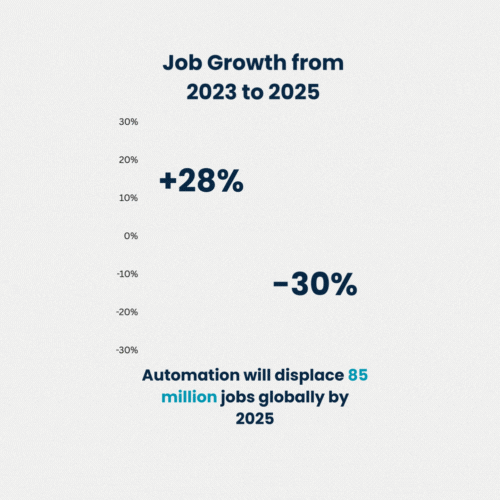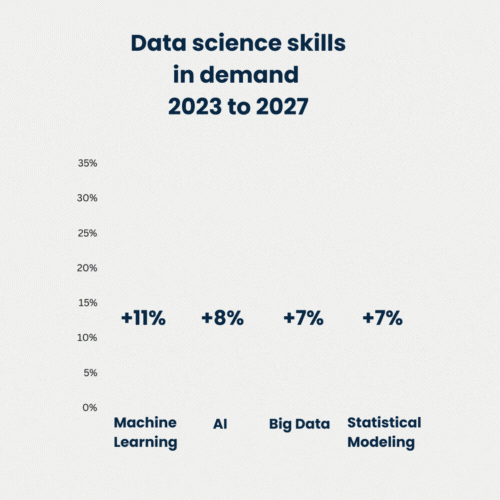The demand for data science professionals is increasing rapidly, with our clients in Japan aggressively searching for talent in this space. Job opportunities are projected to increase by an impressive 28% by 2025 (Source) due to data scientists’ critical role in shaping data-driven decision-making processes across industries.
Successful recruitment of data science and AI/ML recruitment talent can be challenging as the supply of skilled talent is limited in Japan and globally. As a seasoned recruiter specializing in this domain, we can provide valuable insights into the critical skills in high demand.
While there are worries about job losses due to the rise of new technology, the World Economic Forum estimated that the increased usage of artificial intelligence created 58 million new jobs in 2022. Companies are looking to embrace those candidates who can help them take their businesses to the next level through data analysis and machine learning and adapt to the quickly changing technological environment.

Qualifications and Background
To meet our client companies’ requirements, candidates with a degree in computer science, software engineering, electrical engineering, mathematics, or a STEM-related background naturally stand out. While university degrees are beneficial, clients are also interested in candidates with work experience and a passion for data analysis.
Project and Technical Expertise
Candidates who excel at acquiring and analyzing data to enhance company processes and drive transformative change are in high demand. The ability to manage data projects from inception, make data-driven decisions and optimize operations across a company are valuable as many companies are just starting to incorporate data analysis into their company in Japan.
Analytical Proficiency
In addition to practical usage, candidates must demonstrate a deep understanding of the ‘why’ behind algorithms and models. Proficiency in programming, particularly Python, is a prerequisite to analyzing data at scale efficiently. Expertise in implementing Machine learning, including linear and logistic regression and staying up to date with modern modelling techniques is essential for success in these roles.
Independence and Collaboration
Given that many positions mark the initial foray into recruiting ML engineers within the Japanese team, candidates will be expected to operate independently while seamlessly collaborating with the broader team. Communicating with other parts of the organization and implementing change is vital to maintaining existing solutions and creating new solutions.
Let’s go into more detail regarding the most in-demand roles.

Machine Learning/AI Engineers
Role Importance:
Innovation Drivers: ML/AI engineers are relied on to drive change in organizations to help find new and implement business models. Their role involves conceiving, testing, and implementing algorithms that empower machines to learn and make decisions, exerting a profound influence across various industries, ranging from healthcare to finance.
Business Optimization: These professionals are instrumental in enabling organizations to optimize their operations, craft personalized customer experiences, and innovate new products and services. Their contributions are central to the transformative process of converting vast data sets into actionable insights.
“Things get done only if the data we gather can inform and inspire those in a position to make a difference.”
(Dr. Mike Schmoker, Author)
Recruitment Trends:
Specialized Skill Demand: There is a fast-growing demand for engineers with specialized technical competencies in deep learning, neural networks, and natural language processing. Companies are looking for candidates who can demonstrate the ability to communicate with business stakeholders to drive decisions across strategy, marketing and sales.
Adaptable and Continuous Learning: To stay relevant in a rapidly advancing field, recruiters prioritize candidates who exhibit technical proficiency and demonstrate adaptability and a relentless commitment to continuous learning. Staying in sync with the swift progress in the AI and machine learning domain is paramount.

Data Scientists
Role Importance:
Data-Driven Decision-Making: Data scientists are vital to making informed decisions grounded in data analysis. Organizations are rushing to improve their ability to analyze data within and outside their company. Transforming data sets into insights is increasingly demanded by management to make successful strategic decisions.
Cross-Industry Impact: The role of Data Scientists is now critical across many sectors as companies seek an edge over their competition. They wield expertise in predicting trends, deciphering customer behaviour, enhancing operational efficiency, and influencing diverse industries.
Recruitment Trends:
Diverse Industry Integration: The strongest trend is the increasing integration of data science roles into different industry verticals. There is a high demand for professionals who can apply data science principles in many contexts and understand the business case for data analysis.
Ethical and Responsible Data Use: The increased focus on ethics has seen increased demand from companies for data scientists who are skilled in analytics and grasp the ethical nuances of data utilization. Responsible data handling has emerged as a significant facet of their responsibilities.

